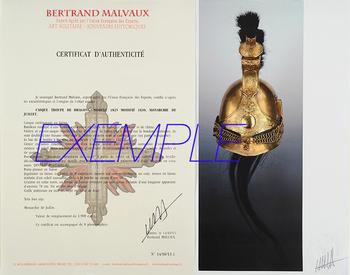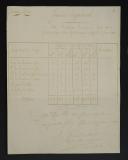
Imperial Guard. DIGITAL STATEMENT of officers, non-commissioned officers, and soldiers killed, wounded, or captured in the engagement of February 8, 1807 (Battle of Eylau), dated February 13, 1807. 18907-11
Sold out
Imperial Guard. DIGITAL STATE of the officers, non-commissioned officers, and soldiers killed, wounded, or taken prisoner in the affair of February 8, 1807 (battle of Eylau), dated February 13, 1807. 18907-11
Manuscript document with letterhead "Great Army" "Imperial Guard"
Detail for each Corps of the killed, wounded, and prisoners or missing.
"Certified in accordance with the states provided by the Corps.
At the General Headquarters in Eylau on February 13, 1807".
Signed "Divisional General, Head of the General Staff: X. Roussel"
1 page. H 28.5 cm x 21.5 cm.
Good condition but somewhat faded, with folds.
HISTORICAL BACKGROUND:
The battle of Eylau took place on February 7 and 8, 1807, at Preußisch Eylau (nowadays Bagrationovsk) in northern East Prussia (current Kaliningrad Oblast), between the forces of the Russian Empire, supported by those of the Kingdom of Prussia, and the French Empire.
After the battle, the French Empire emerged as the victor at the cost of heavy losses.
Napoleon I remained in control of the field but did not achieve the decisive victory he had anticipated.
BIOGRAPHY:
François-Xavier Roussel, born on December 3, 1770, in Charmes in the Vosges region and died on June 10, 1807, at the battle of Heilsberg, was a French general of the Revolution and the Empire.
The son of an army surgeon, he enlisted on May 1, 1789, as a volunteer in the Mestre de Camp Général dragons regiment and became a quartermaster on March 10, 1791. He was discharged on May 1, 1792, but returned to service on August 14 of the same year with the rank of captain adjutant-major in the 9th battalion of volunteers of Meurthe. On December 1, 1792, he joined the general staff of the Moselle army as an adjutant captain, and in 1793, he took part in the campaign of Trèves. On March 5, 1793, he was promoted to first lieutenant colonel of his battalion and was at Pirmasens, where the inexperience of the Convention's commissioners cost the French 4,000 men and almost all their artillery. He was captured by the Prussians on September 14, 1793.
Released at the end of 1795, he resumed command of his battalion on March 21, 1796, brigaded in the 60th infantry half-brigade in the Army of the North. He was promoted to brigadier general on April 20, 1797, in the Sambre-et-Meuse army, by General Hoche. In the sixth year (1798-1799), he occupied the islands of Woorne and Gorée with his brigade to observe the Russians and the British who threatened the coasts of Holland. On August 29, 1799, he was called to the Rhine army and distinguished himself in the battles of Engen on May 3, 1800, and Biberach on May 9 of the same year. Three days before the Battle of Hohenlinden on December 3, 1800, he captured Rosenheim, and on September 23, 1801, he was put on non-active duty.
On December 2, 1801, he obtained a command in the 2nd military division. He was made a Knight of the Legion of Honour on December 11, 1803, and a Commander of the Order on June 14, 1804. On September 5, 1805, he became Chief of Staff of the Imperial Guard division, commanded by Marshal Mortier. He was promoted to the rank of Divisional General on January 26, 1807, and served as Chief of Staff to Marshal Bessières when he was killed by a cannonball on June 10, 1807, at the battle of Heilsberg.
Manuscript document with letterhead "Great Army" "Imperial Guard"
Detail for each Corps of the killed, wounded, and prisoners or missing.
"Certified in accordance with the states provided by the Corps.
At the General Headquarters in Eylau on February 13, 1807".
Signed "Divisional General, Head of the General Staff: X. Roussel"
1 page. H 28.5 cm x 21.5 cm.
Good condition but somewhat faded, with folds.
HISTORICAL BACKGROUND:
The battle of Eylau took place on February 7 and 8, 1807, at Preußisch Eylau (nowadays Bagrationovsk) in northern East Prussia (current Kaliningrad Oblast), between the forces of the Russian Empire, supported by those of the Kingdom of Prussia, and the French Empire.
After the battle, the French Empire emerged as the victor at the cost of heavy losses.
Napoleon I remained in control of the field but did not achieve the decisive victory he had anticipated.
BIOGRAPHY:
François-Xavier Roussel, born on December 3, 1770, in Charmes in the Vosges region and died on June 10, 1807, at the battle of Heilsberg, was a French general of the Revolution and the Empire.
The son of an army surgeon, he enlisted on May 1, 1789, as a volunteer in the Mestre de Camp Général dragons regiment and became a quartermaster on March 10, 1791. He was discharged on May 1, 1792, but returned to service on August 14 of the same year with the rank of captain adjutant-major in the 9th battalion of volunteers of Meurthe. On December 1, 1792, he joined the general staff of the Moselle army as an adjutant captain, and in 1793, he took part in the campaign of Trèves. On March 5, 1793, he was promoted to first lieutenant colonel of his battalion and was at Pirmasens, where the inexperience of the Convention's commissioners cost the French 4,000 men and almost all their artillery. He was captured by the Prussians on September 14, 1793.
Released at the end of 1795, he resumed command of his battalion on March 21, 1796, brigaded in the 60th infantry half-brigade in the Army of the North. He was promoted to brigadier general on April 20, 1797, in the Sambre-et-Meuse army, by General Hoche. In the sixth year (1798-1799), he occupied the islands of Woorne and Gorée with his brigade to observe the Russians and the British who threatened the coasts of Holland. On August 29, 1799, he was called to the Rhine army and distinguished himself in the battles of Engen on May 3, 1800, and Biberach on May 9 of the same year. Three days before the Battle of Hohenlinden on December 3, 1800, he captured Rosenheim, and on September 23, 1801, he was put on non-active duty.
On December 2, 1801, he obtained a command in the 2nd military division. He was made a Knight of the Legion of Honour on December 11, 1803, and a Commander of the Order on June 14, 1804. On September 5, 1805, he became Chief of Staff of the Imperial Guard division, commanded by Marshal Mortier. He was promoted to the rank of Divisional General on January 26, 1807, and served as Chief of Staff to Marshal Bessières when he was killed by a cannonball on June 10, 1807, at the battle of Heilsberg.
Reference :
18907-11

Next update Friday, december 12 at 13:30 PM
FOR ALL PURCHASES, PAYMENT IN MULTIPLE CHECKS POSSIBLE
bertrand.malvaux@wanadoo.fr 06 07 75 74 63
SHIPPING COSTS
Shipping costs are calculated only once per order for one or more items, all shipments are sent via registered mail, as this is the only way to have proof of dispatch and receipt.
For parcels whose value cannot be insured by the Post, shipments are entrusted to DHL or Fedex with real value insured, the service is of high quality but the cost is higher.
RETURN POLICY
Items can be returned within 8 days of receipt. They must be returned by registered mail at the sender's expense, in their original packaging, and in their original condition.
AUTHENTICITY
The selection of items offered on this site allows me to guarantee the authenticity of each piece described here, all items offered are guaranteed to be period and authentic, unless otherwise noted or restricted in the description.
An authenticity certificate of the item including the description published on the site, the period, the sale price, accompanied by one or more color photographs is automatically provided for any item priced over 130 euros. Below this price, each certificate is charged 5 euros.
Only items sold by me are subject to an authenticity certificate, I do not provide any expert reports for items sold by third parties (colleagues or collectors).
FOR ALL PURCHASES, PAYMENT IN MULTIPLE CHECKS POSSIBLE
bertrand.malvaux@wanadoo.fr 06 07 75 74 63
An authenticity certificate of the item including the description published on the site, the period, the sale price, accompanied by one or more color photographs is automatically provided for any item priced over 130 euros. Below this price, each certificate is charged 5 euros.
Only items sold by me are subject to an authenticity certificate, I do not provide any expert reports for items sold by third parties (colleagues or collectors).
